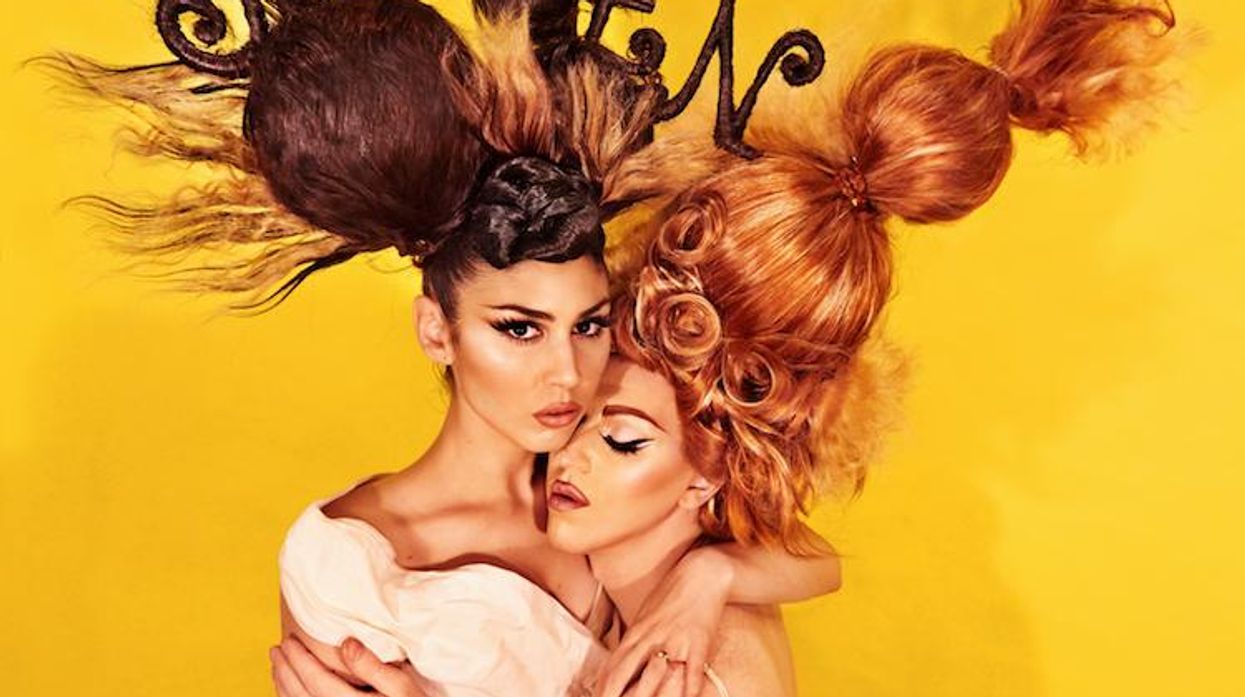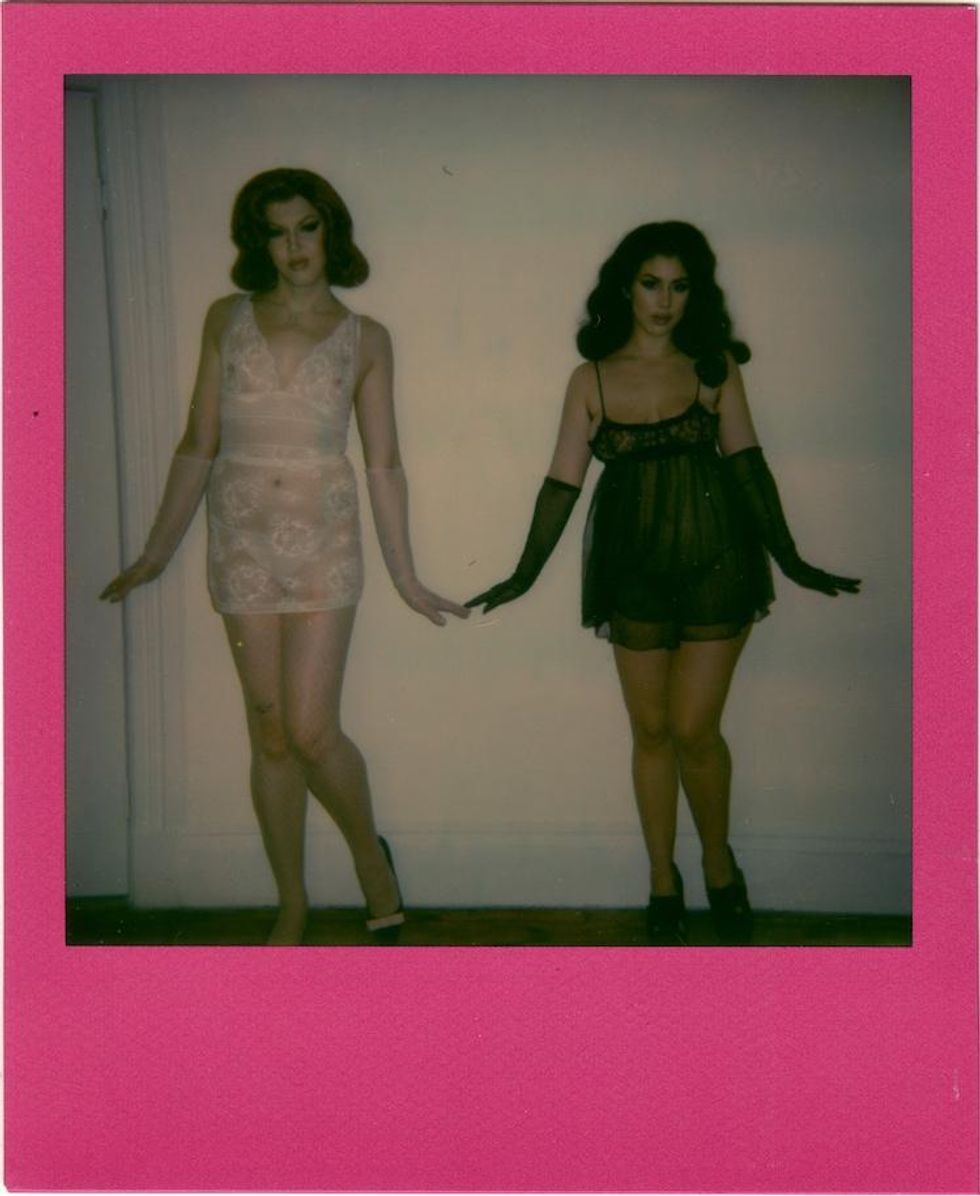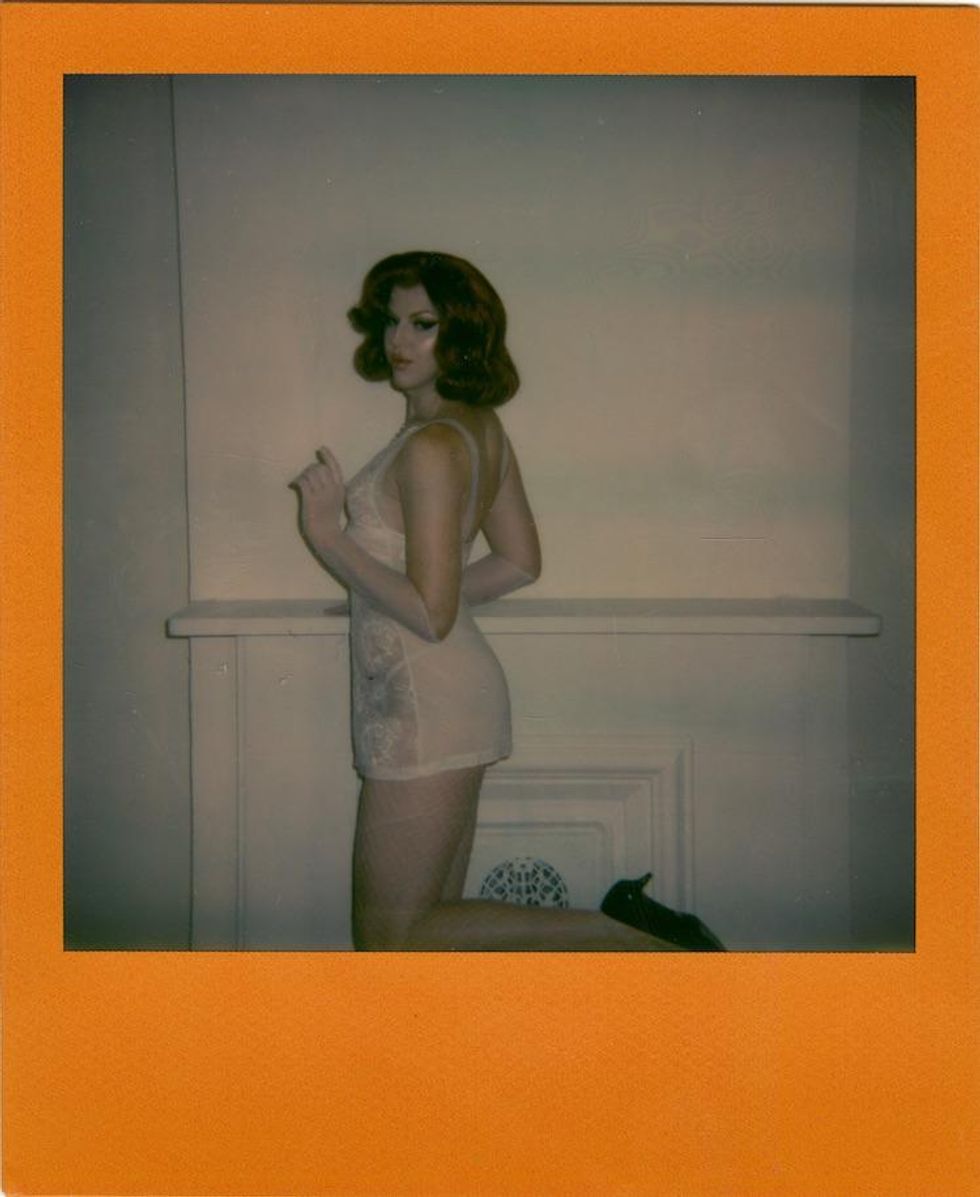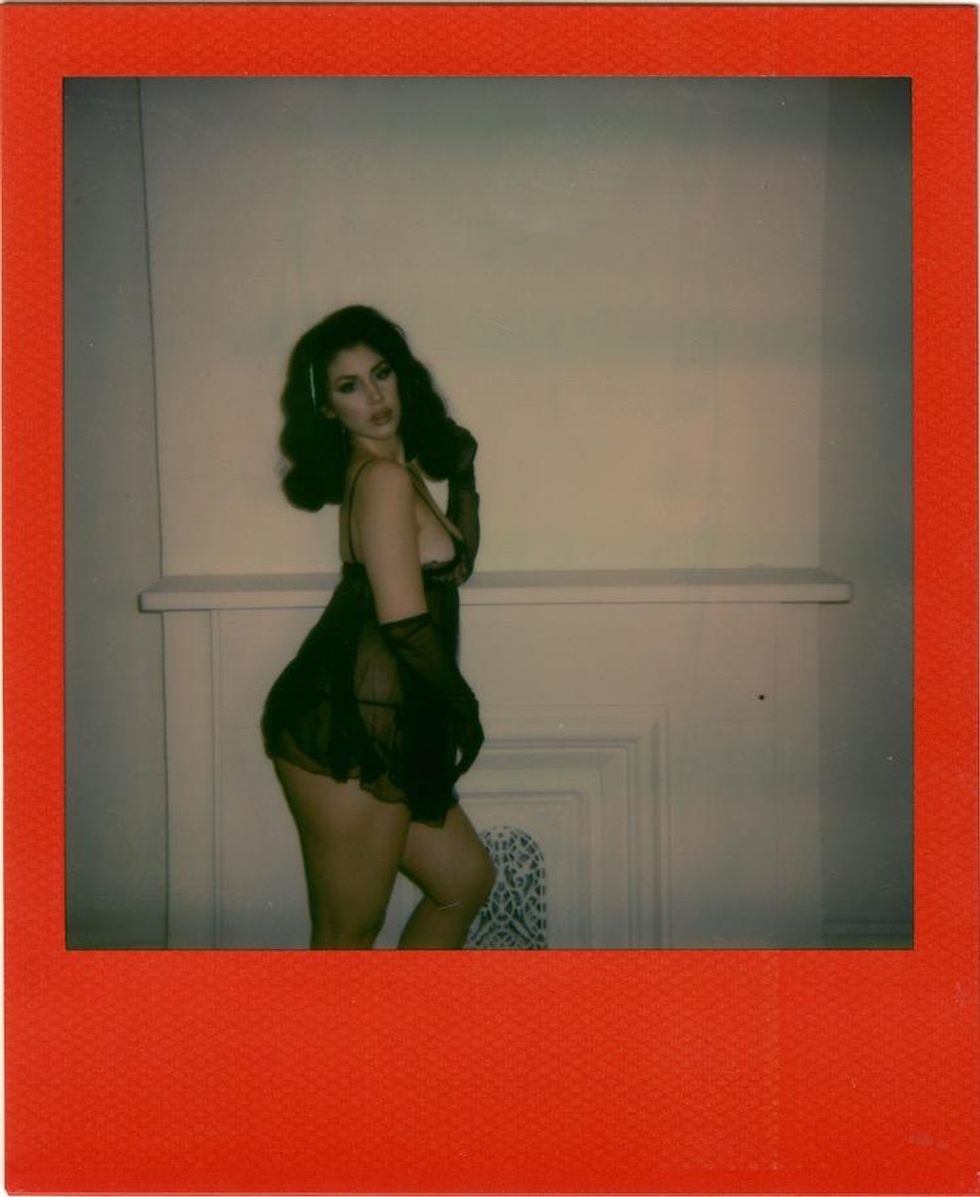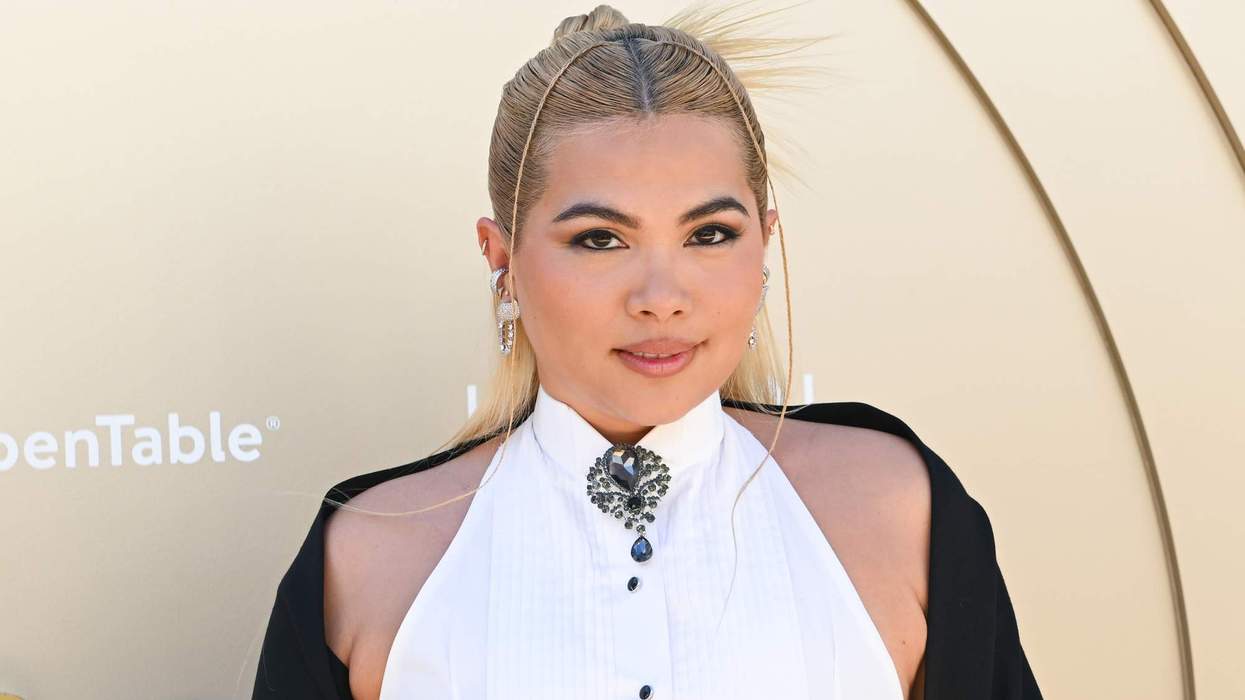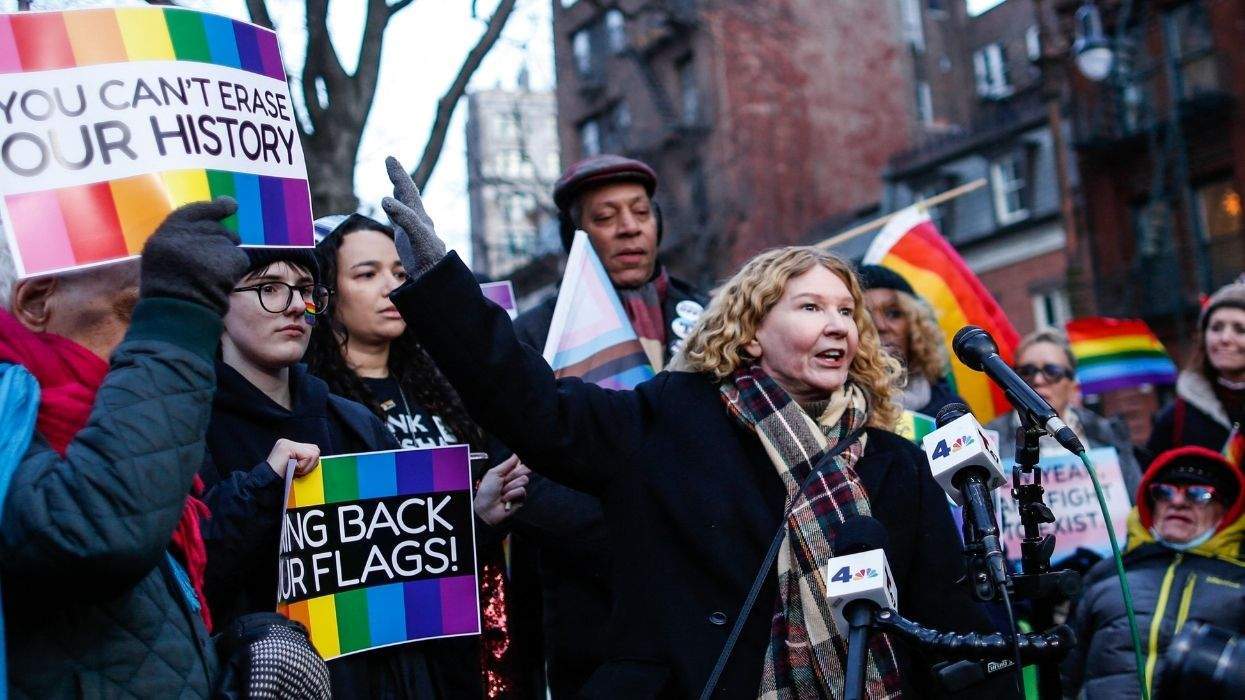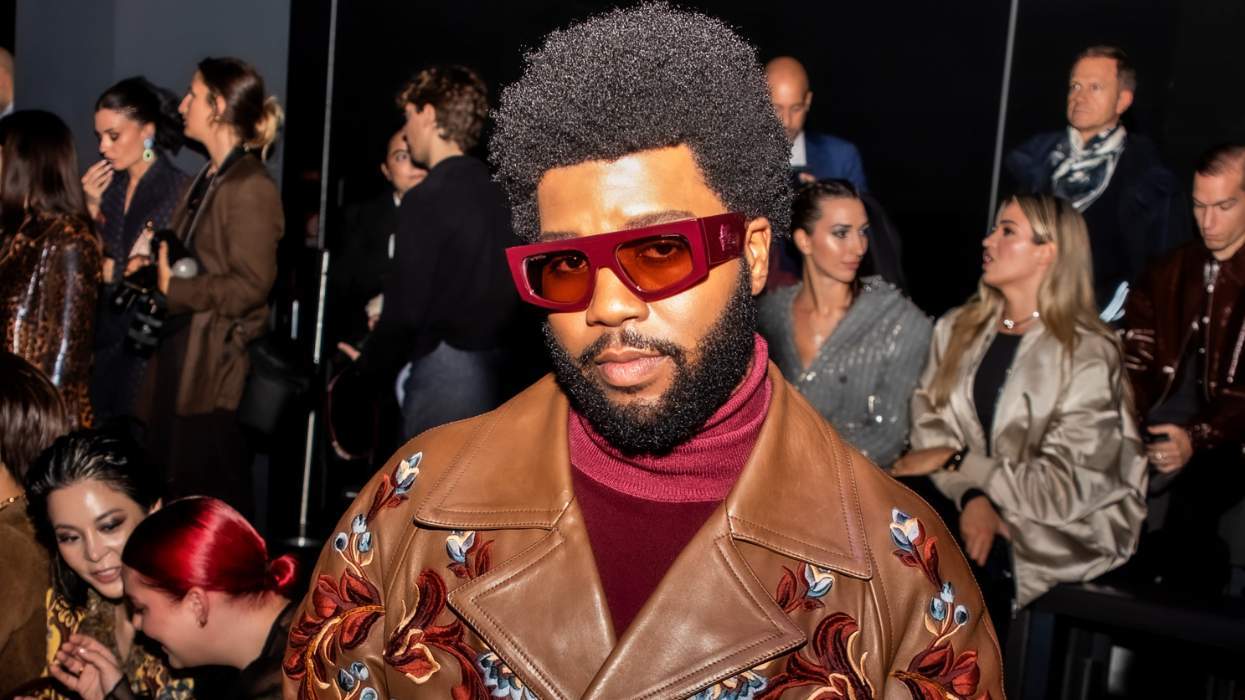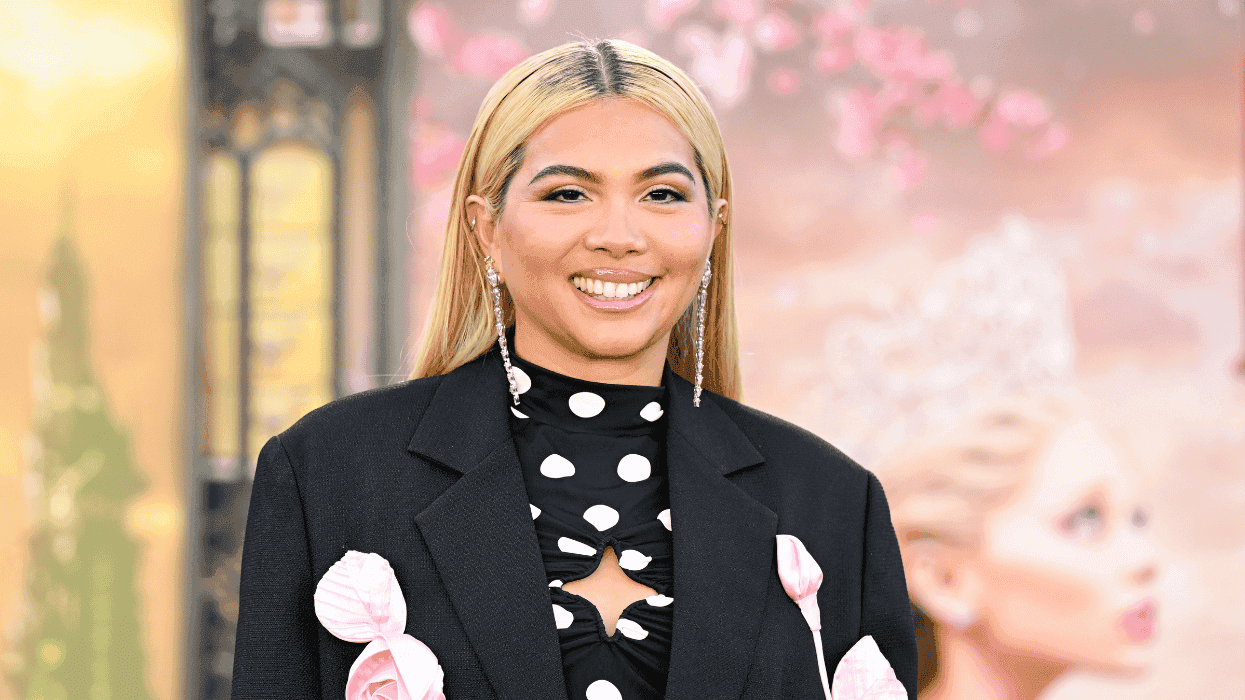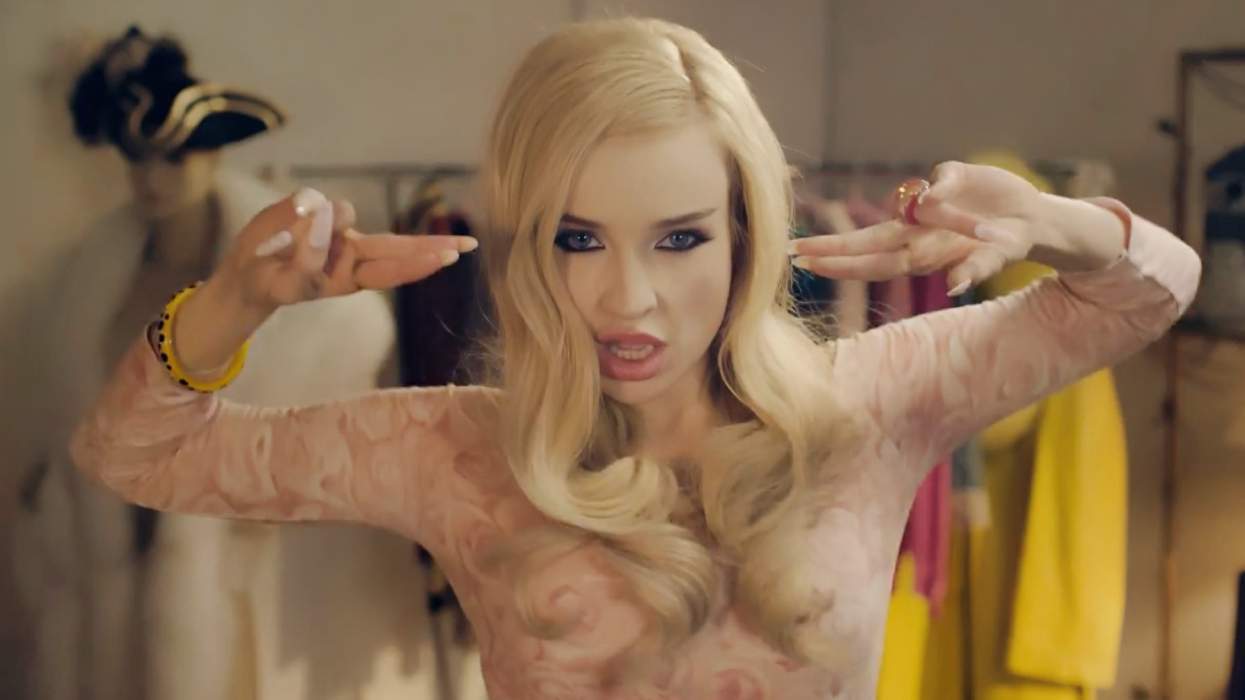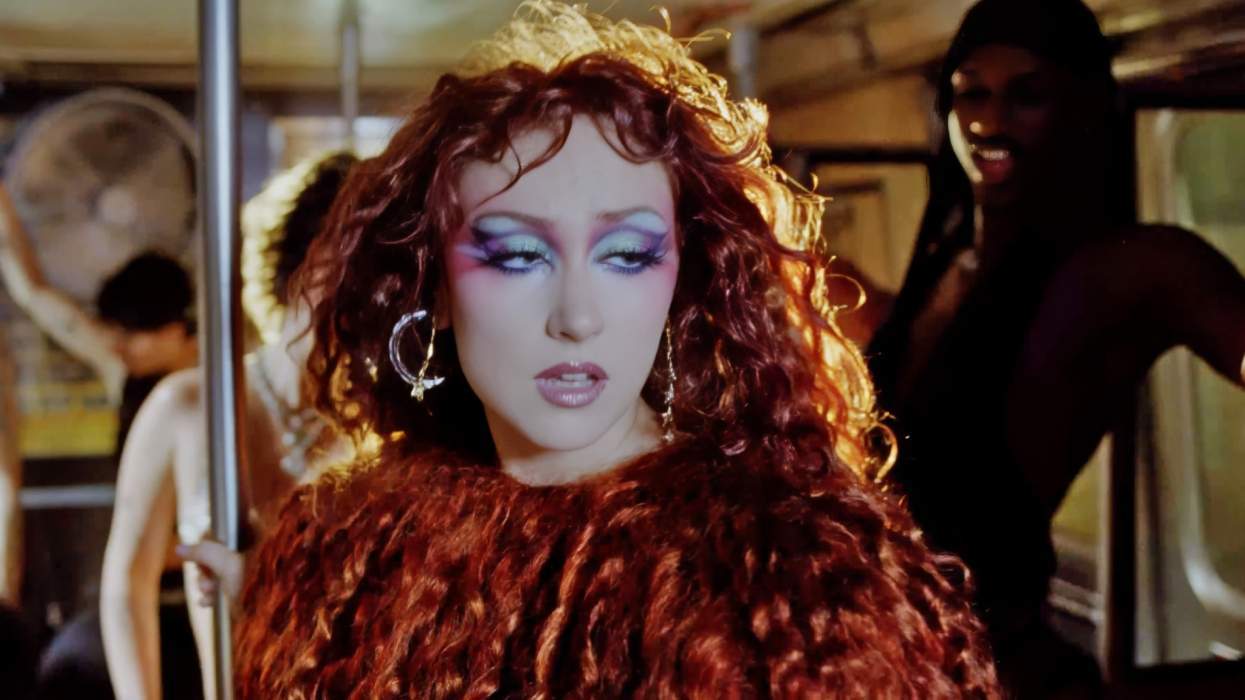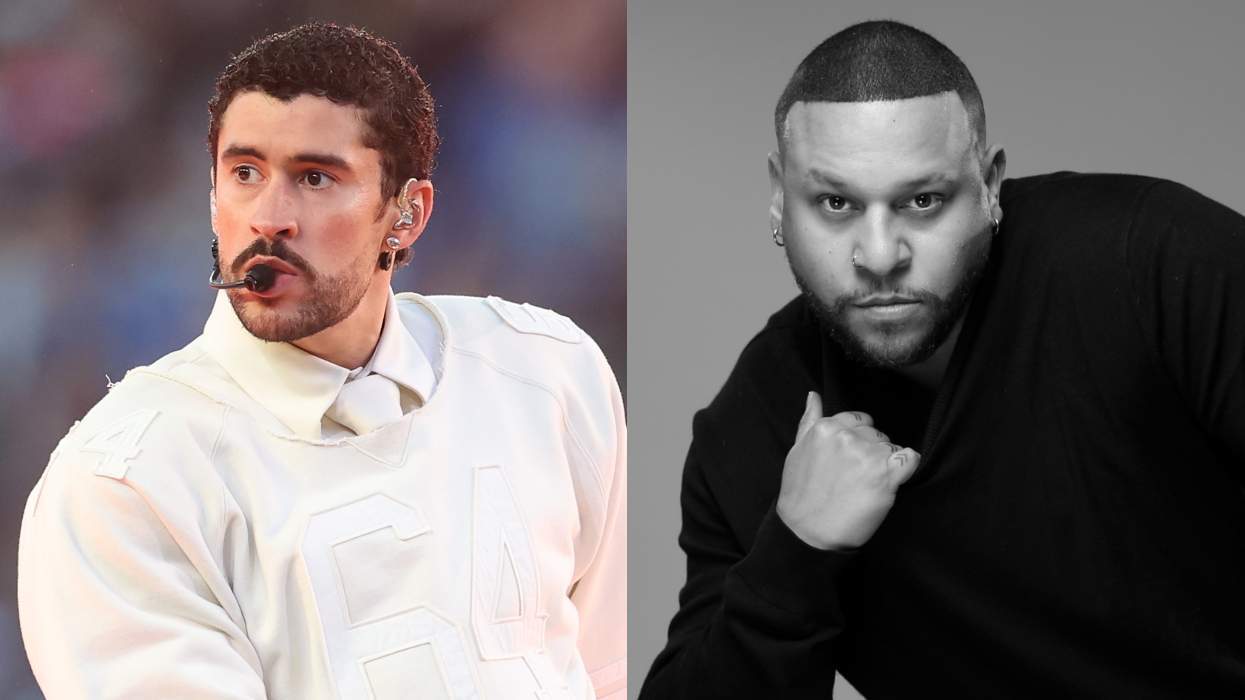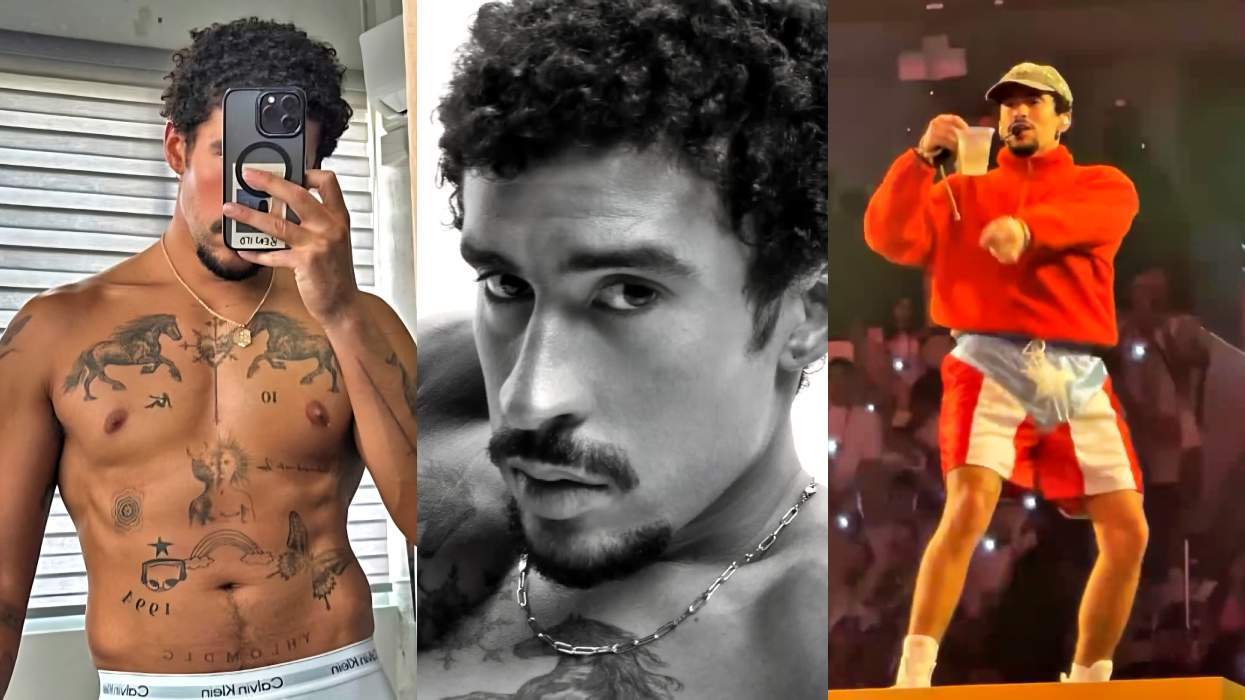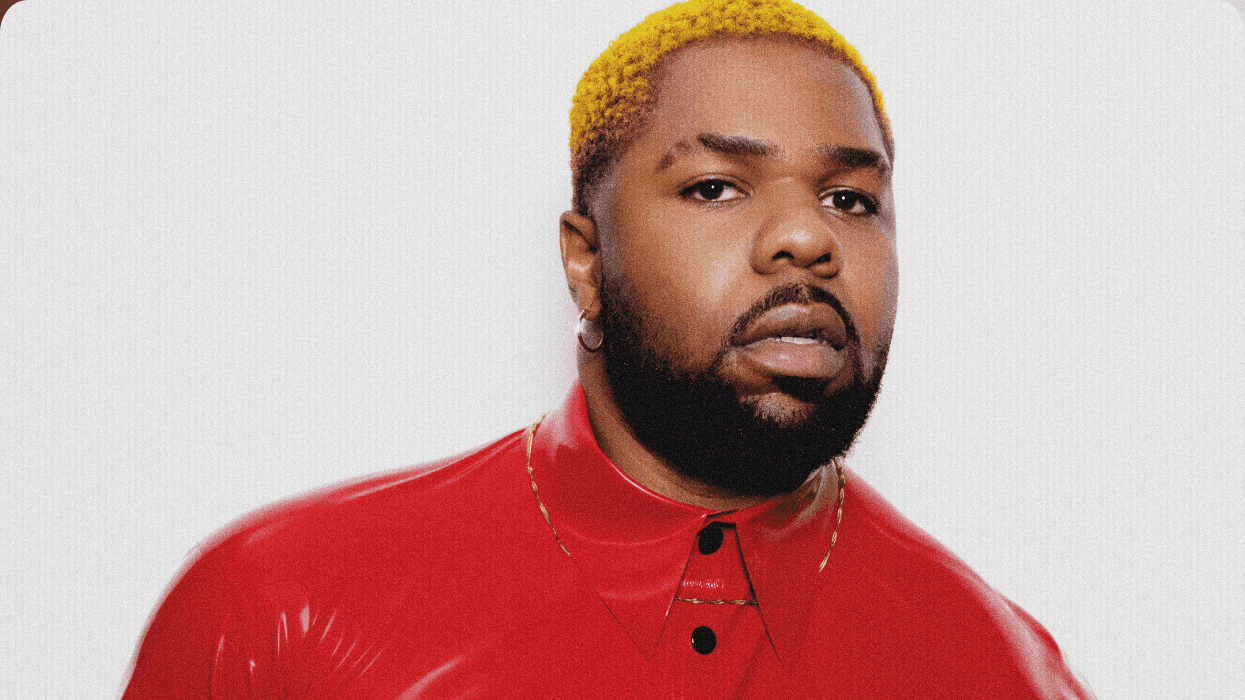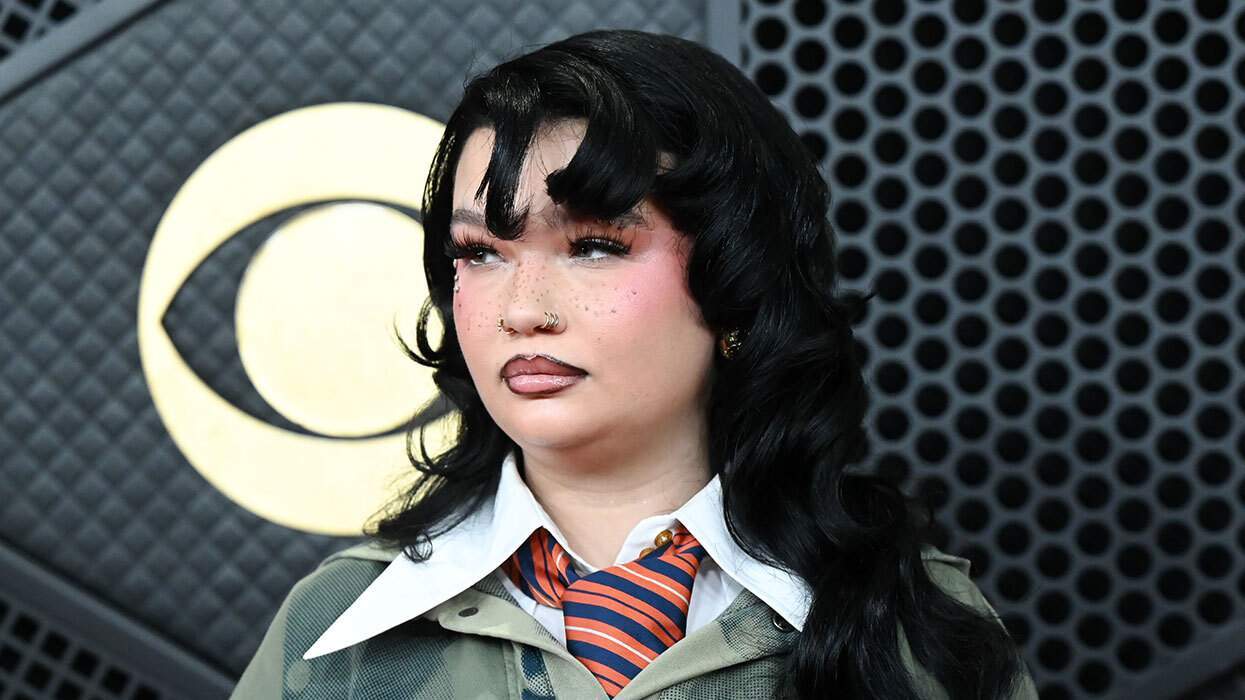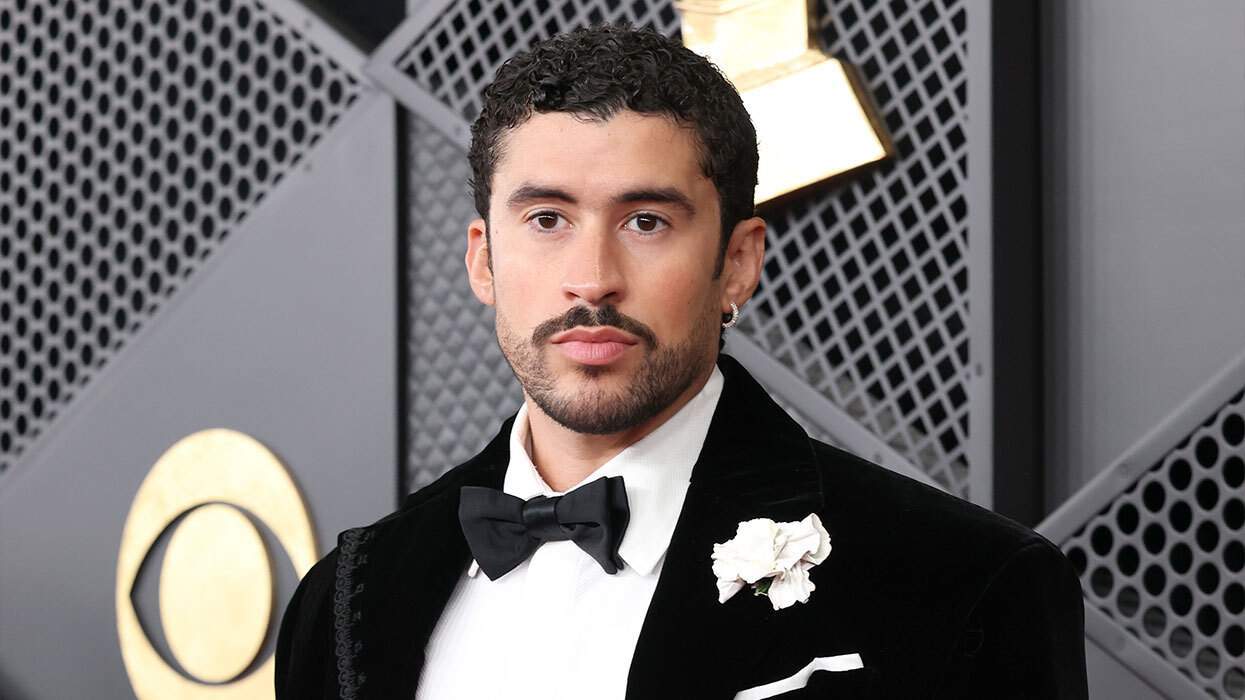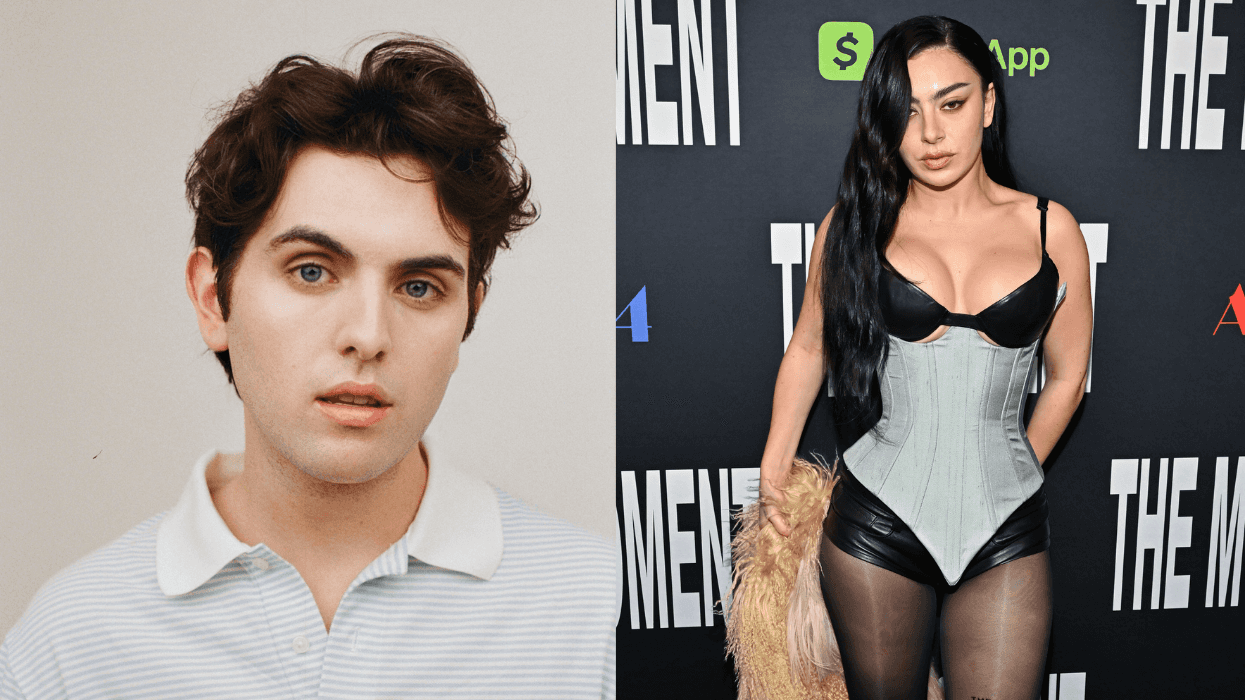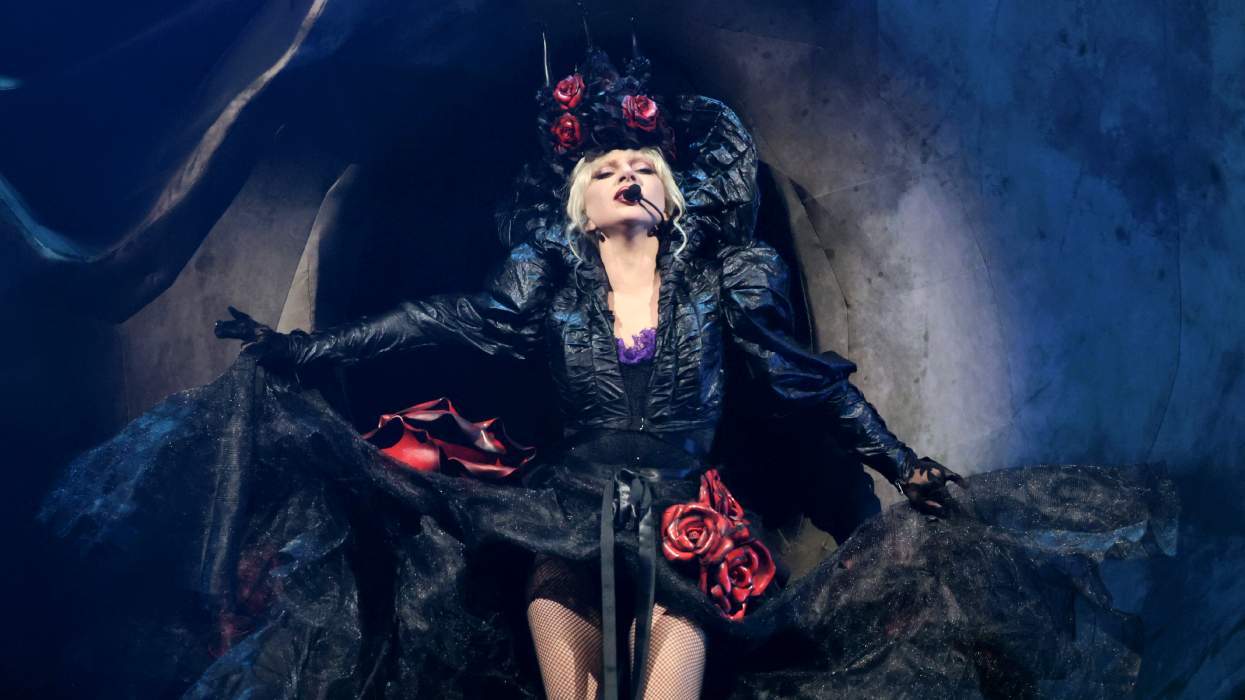"One day you'll know my name," warns Miss Queen Sateen on "Finer Things," off her new self-titled EP with wife and bandmate Exquisite. The glamorous pair calls itself Sateen, and is newly dedicated to music after being swept up in NYC nightlife for the past few years. While this scene helped catapult them to LGBTQ stardom, the two never thought of themselves as mere "club kids," but serious full-time musicians, delivering an ultra-queer '70s disco sound and message of unapologetic self-love and self-realization.
Queen Sateen and Exquisite first became famous in underground New York as a sensationalized "hetero drag couple," which ultimately overshadowed the Brooklyn band's music and, in the end, wasn't an honest description of their identities. When Exquisite came out as transgender, it not only shifted the trajectory of their music, but their relationship and deeper understanding of self. Now, the proud lesbians feel closer to their truths, and create songs with the responsibility of liberating their fans.
The Sateen EP, out today, is a flamboyant celebration of the couple's journey, channeling their collective queerness into music that's equally a political war cry and a flashy pop project. Their songs lift and inspire, delivering sexy anthems for femmes ("Lightning and Thunder"), euphoric tracks encouraging unruly empowerment ("Free Your Mind") and songs for outsiders ("Blacklisted"). The six-track effort ends with a question, as Queen Sateen repeatedly asks, "Do you ever let go?" above Exquisite's dreamy, synth-driven production ("Let Go").
We caught up with the band to talk about breaking free from NYC nightlife, adjusting to Exquisite's transition, and making disco for a new LGBTQ generation.
OUT: What came first? Romance or music?
Sateen: We actually met through the dating app, OKCupid, but ironically it was with the intention of starting a band, not to date each other. We had a lot of mutual influences and seemed to click, musically speaking, right away. After about a month of platonic co-creation, it became clear that there was more to our relationship than friendly collaborators. Within a few weeks of us becoming intimate, Exquisite was moving out of her apartment and into Miss Queen's place. The rest, as they say, is herstory.
Why did you first decide to start going out in NYC's club circuit?
From the beginning, we shared an inherent interest in glamour, fashion, makeup, and even drag. But also, we felt that the indie rock music scene from which we originated was aesthetically stale. We wanted to differentiate ourselves from that pack. Before we ever set foot in a gay club or queer party, we started dressing in drag to develop a dramatic stage presentation as Sateen. We were obsessed with John Waters and Divine, the B-52's, Deee-lite and RuPaul. We wanted to synthesize these influences into something fresh, fun and unique to the contemporary pop music landscape. And not only that, but by participating in New York's underground queer nightlife scene, we felt we could weave ourselves into this rich tapestry of history that we are so in love with.
(From Left): Exquisite & Miss Queen Sateen
How has your music-making process developed over the years?
Miss Queen was very bossy at the beginning. But over time, we developed a symbiosis through listening to records (actual vinyl records), watching movies, and having tons of discussions about who we are as artists. Now, we work in a totally free and organic way. Nothing is forced. Exquisite usually starts things with a track. Much of our music is sample-based, so she can create something for Miss Queen to start singing a rough melody over pretty quickly. From there the songs develop rapidly, though the best of our material usually results from an intention we set, through conversation, long before ever starting any of the music.
A song like "Free Your Mind" is basically a mantra that we gave ourselves. That mantra then becomes set to music, almost randomly. Sometimes songs are even written in the vocal booth. The entire vocal track for "Lightning and Thunder" that you hear on this record was created from an improvisation while recording that very track. So when you're listening to the song, it's not just the final song, but the actual conception of the song itself. The words and music are just mashed up influences playing themselves out within the narrative of where we are in our lives. So, for "Lightning and Thunder," specifically, we are directly taking from the First Choice song "Let No Man Put Asunder," but re-contextualizing it into a lesbian empowerment anthem.
Your sound is very nostalgic and disco-leaning. Where does this come from?
This is one of the most important aspects to what we do. Invoking the disco sound and feel is not just a sonic or aesthetic choice to us--it is a provocation. We cannot help but associate disco with our gay forebearers. In creating a sound, melody or vocal track that is reminiscent of a classic, '70s disco sound we are attempting to remind listeners that we are gay. We want this fact to be front and center--inescapable. We think that one of the main reasons disco, as a genre, is so often dismissed is because of its inherent gayness.
When you think about crowds of people burning, or steam rolling piles of disco records at football or baseball stadiums, wearing shirts or waving banners that read "Disco Sucks," it's easy to forget the context in which these quasi-violent actions occurred. The truth is that they were coming from '70s rock fans, who were pretty much exclusively white, and were all reacting to their own homophobia and racism. To us, this historical de facto queer bashing via disco destruction makes it imperative to continue to proudly wave the disco flag, because it is just like waving a gay flag.
The sheer quality of female vocalists during that era, which also so deeply informed the house divas of the '90s, is essential to the singing style that Miss Queen Sateen has adapted and our overall message of female empowerment. We adore artists like Sister Sledge, Loleatta Holloway, Chaka Khan, Donna Summer, Teena Marie, Stephanie Mills, Deniece Williams, Minnie Ripperton, Evelyn Champagne King, and so many others.
Related | Premiere: Sateen's 'Love Makes the World' is a Queer Anti-Trump Anthem
How do you see this EP as a development from your Greatest Hits album?
Greatest Hits was us learning to walk. With Sateen, we feel like we are finally in our own bodies. We are able to move about freely at last. We feel like we have truly come into our own, not just musically, but also in our lives. Exquisite is living her truth as a trans woman and we are living as out and proud lesbians. Before, we had to be accountable for so many half-truths. We were a real couple, but were constantly being sensationalized as a "hetero drag couple." So much emphasis was placed on our role in nightlife, and the label of being "club kids." It was very suffocating, and in a way Greatest Hits was a reflection of that. Now, we feel that we can be truly accountable for who we are and what we say, both in our lives and in our music.
Exquisite
What are some central themes on this EP?
One of the main themes correlates to us moving beyond the things that held us back on Greatest Hits, and moving closer to living our truths. But we want it to be more universal than an individual, subjective take on that. We wanted the record to actively instruct the listener to move away from their inhibitions and toward their own truth. "Let Go" is about literally letting go of the preconceptions that dictate your life; "Free Your Mind" is similarly about freeing yourself of the cultural conditioning that shackles you to thinking that you have to be or behave in accordance with those conditioned expectations.
Another major theme is female/femme empowerment. "Finer Things" introduces this theme by proffering the notion that, just because you like typically feminine items, which are often considered superficial, does not mean that others have a right to shame you for that. And even though it refutes the need for men, the actual narrator of the song is never gendered, leaving the potential for it to be related to any gender identity. That theme is later expanded in "Lightning and Thunder," where the typical phrase associated with marriage, "Let no man put asunder," is reimagined by adding, "Let no man divide us/ Confide in us/ Rely on us/ We are the only ones we can trust/ Just us two/ Just me and you." This is an abstract statement until you put it into the context of our relationship as lesbians. It then becomes a potential argument for queer love and marriage, as it seems to pit two individuals, assumed to be together in a possible love relationship, against this notion of traditional marriage.
Related | 28 Queer Americans on What Pride Means to Them
What's the story behind "Blacklisted"?
"Blacklisted" was written back when we were working in clubs a lot. At that time, we were constantly placed into a box that we were not comfortable with. We were expected to be sort of club accessories, but never musicians or performers. We felt like our potential, rather than being nurtured, was being suffocated. Because of this, we started to feel a great deal of unrest. We had lost sight of our real goal and were starting to break down. In order to get back on target, we had to forfeit our power, but there was no clean way to do that. We ended up ruining a lot of relationships in that process, and it revealed a lot about those relationships. We had expected friends to stand by us, even though we were not in our privileged position anymore (with respect to nightlife and club culture). But that was completely wrong. People were "blacklisting" us and it felt like we were unpopular teenagers again.
How was your experience writing that song?
When we wrote this song, it was a form of catharsis. We knew we couldn't do anything to change people's minds about us, or repair the relationships that we lost by leaving our night club "thrones." So we made this song as a way of dealing with that. It ultimately is a song against clique mentality and how fleeting popularity can be. The irony is that, even though it deals with a lot of personal details, the song becomes pretty universal. This is because popularity is a foolish pursuit. Popularity must always shift--it must always be in flux. That is the very nature of popularity. It can only exist with the counterpoint of unpopularity. No matter what, you just have to stay absolutely true to yourself, because your relationship to popularity will always shift. We hope that if somebody feels left out or like an outcast, they can listen to this song, empower themselves and have their own private dance party.
How has Exquisite's coming out as trans impacted your marriage?
Within the confines of our marriage and love relationship, everything started to really crystalize. Miss Queen says, about Exquisite before transitioning, that she was always holding back. Like the pieces were all there, but something was still not right. When Exquisite started her journey towards her truth, especially when she began HRT (Hormone Replacement Therapy), the puzzle pieces finally started to fit and a happy, fulfilled person began to emerge. The importance of that cannot be underestimated and our relationship has only benefitted from this. Also, Miss Queen has been able to come into her own sexuality, as a pansexual identifying individual. This was something that she was always afraid of and, because of being with a trans woman she has also been able to tap into her true identity.
Miss Queen Sateen
How has it affected the band dynamics?
We always struggled to distribute the attention and focus evenly between the two of us. People constantly wanted Miss Queen to be the face, as well as the voice of the band. But we always knew that, as a duo, this was not going to be a healthy way to develop our group. When Exquisite stepped forward into her true identity, it became all the more important to us to make sure that she was not going to be sidelined. This is because, while it was an important personal revelation for her, it was even more important for its impact on both of us. Exquisite came out as a trans woman, but in turn we both became lesbians. These revelations changed the trajectory of our group so much, it is difficult to imagine our group's identity before she was transitioning. We used to be subject to so many labels that we were uncomfortable with. Now, we feel like the labels are truths, rather than sensationalized gimmicks and tag lines to draw attention to our group. We have a focus and a mission, as queer women, that previously eluded us. And now, Exquisite is a focal point, rather than an afterthought.
Related | Sales From This Queer Illustrator's Print Benefit a Trans Woman's FFS
What resistance have you experienced as a new band?
Since day one, we have been completely independent. This was never a choice, it's just how it happened. We have tried to obtain management; we have tried to get representation by booking agents and publicists; we have tried to release this very album with record labels. All of our efforts have fallen upon deaf ears. Even things that most bands take for granted, like getting bookings or press for their releases, has been difficult for us. We can't say for certain why this is, but we have a feeling it is because we are too femme, too gay and too loud. We are unapologetic and uncompromising about who we are as people and artists. Maybe it is cocky to say this, but we think we are trailblazers. As such, struggle seems to be an intrinsic part of our experience.
As far as media exposure, it feels like certain gay artists have been able to achieve success, but only under certain circumstances. Some queer artists are able to relegate themselves to more of an art context. There, their sexuality can contribute to their intellectual value, thus making them viable. Other gay artists are able to achieve more pop success, but only because they present a watered-down, non-threatening version of queerness. Neither of these personas apply, or really even appeal to us. So we are often relegated to queer-centric press only. We are grateful that any place exists where voices like ours are given a platform, but we can't help but feel that it is absurd that we are excluded from music-centric media because of our gayness. It seems that, as a society, we should be beyond this. It has been an uphill battle, but hopefully by the end of it at least our asses will look great.
How do you hope to inspire a new generation of queers through your identities?
Exquisite often remarks that, part of her struggle in coming out relates to her lack of role models. In her youth, she can recall sometimes seeing trans women in movies or on television, usually in compromising situations, being negatively depicted. Seldom can she think of positive portrayals of trans women--especially absent were lesbian trans women cultural figures. If they were shown in any capacity, they were pretty much never classically feminine, lipstick lesbian trans women. So, as a lipstick lesbian trans woman herself, she had no idea that her identity was valid, let alone even existed. Her visibility, and the visibility of our relationship is a rare offering to young queers that they can be gay, trans and feminine all at once. Even if that unusual combination is not specifically relatable to a kid growing up with an atypical gender identity or sexuality, we hope they can feel comforted by the fact that not everybody has to be cookie cutter straight (or gay, for that matter). We hope to serve as role models for exceptional identities, even within a subculture.
How about through your music?
So much of the work we do centers on our tendencies toward cliche feminine characteristics. We like to wear makeup, we like to dress in sexy clothing and we like to act in a way that people designate as "high femme." Navigating the world with this kind of appearance, we cannot help but take note of the demeaning way that people, especially heterosexual, cisgender men, treat us. This is especially apparent in our work as musicians. That world is filled with individuals who want to discredit us solely based upon our appearances and overt sexuality. By trudging through the difficulties that are presented to us in this realm, we hope to build a new infrastructure that can support queers, especially femme queers. We know there are kids out there that are talented, but, because of all the discouragement that queer femmes face, their voices are being silenced. We hope that, by fighting this anti-femme attitude, we can build a more promising path for future artists with a similarly marginalized voice and identity.
Polaroids: Anthony Urrea


